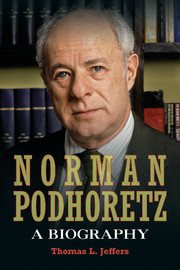Book contents
- Frontmatter
- Contents
- Illustrations
- Acknowledgments
- Prologue
- 1 Brownsville
- 2 Columbia
- 3 Cambridge
- 4 The Family and the Army
- 5 The Practicing Critic
- 6 Boss
- 7 “This Was Bigger than Both of Us”
- 8 One Shoe Drops
- 9 Dropping the Other Shoe
- 10 Liberalism Lost
- 11 George Lichtheim, Pat Moynihan, and a Lecture Tour
- 12 Domesticities, Lillian Hellman, and the Question of America's Nerve
- 13 Moynihan, Podhoretz, and “the Party of Liberty”
- 14 Breaking and Closing Ranks
- 15 Present Dangers
- 16 “The Great Satan of the American Romantic Left”
- 17 Regulated Hatreds
- 18 Culture Wars
- 19 A Literary Indian Summer
- 20 Verdicts
- 21 New Wars for a New Century
- Epilogue
- Notes
- Bibliography
- Index
4 - The Family and the Army
Published online by Cambridge University Press: 07 September 2011
- Frontmatter
- Contents
- Illustrations
- Acknowledgments
- Prologue
- 1 Brownsville
- 2 Columbia
- 3 Cambridge
- 4 The Family and the Army
- 5 The Practicing Critic
- 6 Boss
- 7 “This Was Bigger than Both of Us”
- 8 One Shoe Drops
- 9 Dropping the Other Shoe
- 10 Liberalism Lost
- 11 George Lichtheim, Pat Moynihan, and a Lecture Tour
- 12 Domesticities, Lillian Hellman, and the Question of America's Nerve
- 13 Moynihan, Podhoretz, and “the Party of Liberty”
- 14 Breaking and Closing Ranks
- 15 Present Dangers
- 16 “The Great Satan of the American Romantic Left”
- 17 Regulated Hatreds
- 18 Culture Wars
- 19 A Literary Indian Summer
- 20 Verdicts
- 21 New Wars for a New Century
- Epilogue
- Notes
- Bibliography
- Index
Summary
Podhoretz had to wait a full five months before being drafted. Like Saul Bellow's “dangling man,” he slept late and goofed off a bit, yet, given “a superego like a horse,” he also wrote six articles for Commentary. Cohen and the other editors had liked the piece on Malamud, which came out in March 1953, and the “paternally proud” Warshow, “like a broker ticking off the latest stock-market reports,” kept tabs on what people were saying about him. Forget about Malamud's hero Roy Hobbs; Clem Greenberg declared Podhoretz “the natural.”
This was welcome after his somewhat frosty good-bye to Cambridge. There was nothing wrong with being too American in America, especially at Commentary, where knowing about baseball was a plus and essays on big-band music, television, or Western and gangster movies were comfortably juxtaposed with essays about the Lodz Ghetto, the Cold War, or Martin Buber. By the early fifties, Commentary, sponsored by but editorially independent of the American Jewish Committee (AJC), could claim partial ownership of American culture in a way that its spiritual predecessors, the Menorah Journal (1915–62) and the Contemporary Jewish Record (1938–45), never could. Back in the mid-forties, when Alfred Kazin, in a Partisan Review piece on Francis Parkman's Oregon Trail, had waxed eloquent about “our” American forests, Philip Rahv had teasingly asked, “Our forests, Alfred?” Commentary was implicitly answering: yes, “why not ‘our’ this time?”
That assertive question prompted Partisan Review's 1952 symposium titled “Our Country and Our Culture.
- Type
- Chapter
- Information
- Norman PodhoretzA Biography, pp. 37 - 46Publisher: Cambridge University PressPrint publication year: 2010



